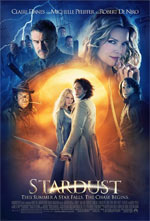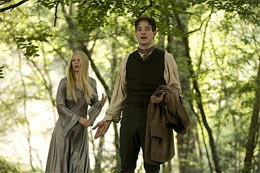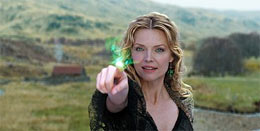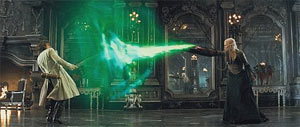
Stardust

 – for fantasy violence and some risque humor.
– for fantasy violence and some risque humor.
Director: Matthew Vaughn
Starring: Charlie Cox, Claire Danes, Michelle Pfeiffer
Running Time: 2 hours, 8 minutes
Theatrical Release Date: August 10, 2007
Official Site

Plot Summary
“Stardust,” based on the best-selling graphic novel by Neil Gaiman and Charles Vess, takes audiences on an adventure that begins in a village in England and ends up in places that exist in an imaginary world. A young man named Tristan (Charlie Cox) tries to win the heart of Victoria (Sienna Miller), the beautiful but cold object of his desire, by going on a quest to retrieve a fallen star. His journey takes him to a mysterious and forbidden land beyond the walls of his village. On his odyssey, Tristan finds the star, which has transformed into a striking girl named Yvaine (Claire Danes). However, Tristan is not the only one seeking the star. A king’s (Peter O’Toole) four living sons – not to mention the ghosts of their three dead brothers – all need the star as they vie for the throne. Tristan must also overcome the evil witch, Lamia (Michelle Pfeiffer), who needs the star to make her young again. As Tristan battles to survive these threats, encountering a pirate named Captain Shakespeare (Robert De Niro) and a shady trader named Ferdy the Fence (Ricky Gervais) along the way, his quest changes. He must now win the heart of the star for himself as he discovers the meaning of true love. (from MovieWeb.com
Film Review
Fantasy films can be a fun genre with the right mix of originality, familiarity, and imagination. Stardust brings to life a graphic novel about an enchanted kingdom where a teenage boy crosses a forbidden boundary to bring back a shooting star as a gift for the girl of his dreams.
The approach to Stardust brings to mind films like The Brothers Grimm and a touch of The Princess Bride or even Big Fish. It’s that kind of enchanted fairytale world that is unique and creative, bringing the viewer back to the days of their youth when dreaming of extraordinary things was commonplace. But Stardust incorporates some modern and adult themes into its fantasy world, making it less of a family affair than, say, something like The Princess Bride.

The cast helps make Stardust as fun as it is. Relatively newcomer Charlie Cox is the story’s lead character, Tristan, while Yvaine, the fallen shooting star, is wonderfully portrayed by Claire Danes. To round out the cast, Michelle Pfeiffer fills in as Lamia, a hideous old witch who hopes to use Yvaine to restore her beauty, while Robert De Niro plays an unorthodox pirate leader named Captain Shakespeare and Sienna Miller is the spoiled brat Victoria, the object of Tristan’s affections. Cox is an inspired pick to play such a developed character as Tristan – a young boy who, in a short time, matures into a man who must overcome some extraordinary trials and challenges. Cox successfully plays Tristan as a hopeless romantic who’s a bit of an outcast, and later also fits the hero bill just as well. I’ve also never before been quite as impressed with a performance from Claire Danes, but she was definitely at her best, and quite believable, as a spunky shooting star in personified form. Pfeiffer is a wonderful addition as she juggles being beautiful and downright hideous as the film’s chief villain, while De Niro offers one of the strangest roles I’ve ever seen him play, as a sympathetic cross-dressing reluctant pirate captain.
The way the film handles sexuality in such a casual nature may be its biggest downfall. Tristan is born out of a one night stand his father had in his youth with an imprisoned woman he spontaneously meets in a market in Stormhold. Furthermore, something like this happens later on again when two characters confess their love and proceed immediately to bed. It’s sad that a movie about the innocence of love must mix-up lust and the physical expression of love with what love truly is. On top of that, De Niro’s Captain Shakespeare is a closet crossdresser who actually hates violence but feels he must hide his true personality from his crew in order to hold on to his reputation as being a fearsome pirate. While the situation is clearly over-the-top and often comical, it seems a bit out of place and forced in a story like this.

Sexual content aside, Stardust really is a clever film. Many different kinds of people want to find Yvaine for unique reasons, including seven sons of a deceased king who all want each other dead in order to succeed as the ruler of Stormhold. As each one is bumped off, we see their black and white ghosts at different moments throughout the duration of the film, and it’s the chief source of comedy for the story. Ricky Gervais, who may be most known for his role in the BBC’s original version of the show The Office, also provides comic relief as Ferdy The Fence, but he’s hardly around long enough to do much unfortunately, and if you’ve seen the trailer you’ve pretty much seen the highlights of his scenes. Stardust also drives home a wonderful theme about discovering what true love is, as well as overcoming societal statures to achieve great things. No one would ever peg Tristan as a hero from the start, so to see him defy all odds and realize the girl of his affections might not be all she is to his immature thinking says something for not only the underdog, but for the “popular crowd” as well. It’s not a new theme by any means, but a great way of telling that story.
Violence is a bit strong. The ghosts of the king’s sons are apparitions of the men in the state they were in when they died. One has an axe in his head, another seems to have been burned to death – and we see their charred face with some skin missing on it, one has a line across his neck with a blood stain beneath it (seen in black and white), and another’s face is half-flattened from falling to his death. Some characters are stabbed or poisoned to death, while another’s arms and legs are broken through the use of a voodoo doll. We also see a victim of magic run into a wall after their head disappears, and another is disintegrated. Not much of the violence is especially graphic, however it’s definitely not family friendly. Language isn’t really an issue, so what should be a caution for parents to consider is mainly the sexual implications and violence.
When all is said and done, Stardust is a magical fairytale that is entertaining as well as a good story of good vs. evil and discovering true love as well as who we’re meant to be. Unfortunately, along the way the film offers a fair share of mature content that keeps this from being a family outing. Toning down some of the adult themes may have made this a story to revisit again and again.
– John DiBiase (reviewed: 8/16/07)
Parental Guide: Content Summary
![]() Sex/Nudity: Dunstan meets princess Una, who kisses him and when he asks what she wants of him, she takes him into a carriage and locks the door. We find out that nine months later, he was given a souvenir from his one night with Una, and it’s a basket with baby Tristan inside; Lamia turns younger and beautiful again, and drops her robe to stand nude in front of the mirror. We don’t see any nudity, but her sister rolls her eyes at her display; Lamie turns a man into a goat and then back into a man and then to a woman, who then looks at her cleavage and touches her chest a bit (since in reality, it’s still a man); Lamie invites Yvaine into an inn and encourages her to get out of the rain and her wet clothes. Lamie tells the man who’s now a woman to help Yvaine, who smiles at the thought of helping her out of her clothes. We then see Yvaine in a bath but there’s no nudity; Primus soaks himself in the tub and we see his bare chest. He flirts with Yvaine and uses innuendo about the size of his manhood; Several times later in the film, we see Primus’ nude ghost, but either a towel covers his crotch or camera positioning blocks any explicit nudity; Captain Shakespeare fakes to his crew that he’s a womanizer and makes comments to them that Yvaine is a wench, and that he is taking her to his courters to have his way with her. We later learn he’s gay and pretending to be ruthless for his crew’s sake – and that he’s never killed anyone, despite what his crew might believe; Tristan knocks Yvaine over into a bush to hide from passerbys, and he falls on top of her. She asks if he’s tempted, and he asks by what, and she tells him immortality (possibly hinting that he could kill her to live forever); As Lamie uses her magic, she begins to turn hideously old again. At one point, she uses a bit to fix her hair from falling out, and we see her clothed chest suddenly droop; We see Yvaine soaking in a tub again, and when Tristan peeks in on her, she scolds him and emerges in a towel. The two then kiss and we see a shot of one of the king’s son’s ghosts peeking in on them (the others call him a pervert). We then see Tristan and Yvaine in bed together
Sex/Nudity: Dunstan meets princess Una, who kisses him and when he asks what she wants of him, she takes him into a carriage and locks the door. We find out that nine months later, he was given a souvenir from his one night with Una, and it’s a basket with baby Tristan inside; Lamia turns younger and beautiful again, and drops her robe to stand nude in front of the mirror. We don’t see any nudity, but her sister rolls her eyes at her display; Lamie turns a man into a goat and then back into a man and then to a woman, who then looks at her cleavage and touches her chest a bit (since in reality, it’s still a man); Lamie invites Yvaine into an inn and encourages her to get out of the rain and her wet clothes. Lamie tells the man who’s now a woman to help Yvaine, who smiles at the thought of helping her out of her clothes. We then see Yvaine in a bath but there’s no nudity; Primus soaks himself in the tub and we see his bare chest. He flirts with Yvaine and uses innuendo about the size of his manhood; Several times later in the film, we see Primus’ nude ghost, but either a towel covers his crotch or camera positioning blocks any explicit nudity; Captain Shakespeare fakes to his crew that he’s a womanizer and makes comments to them that Yvaine is a wench, and that he is taking her to his courters to have his way with her. We later learn he’s gay and pretending to be ruthless for his crew’s sake – and that he’s never killed anyone, despite what his crew might believe; Tristan knocks Yvaine over into a bush to hide from passerbys, and he falls on top of her. She asks if he’s tempted, and he asks by what, and she tells him immortality (possibly hinting that he could kill her to live forever); As Lamie uses her magic, she begins to turn hideously old again. At one point, she uses a bit to fix her hair from falling out, and we see her clothed chest suddenly droop; We see Yvaine soaking in a tub again, and when Tristan peeks in on her, she scolds him and emerges in a towel. The two then kiss and we see a shot of one of the king’s son’s ghosts peeking in on them (the others call him a pervert). We then see Tristan and Yvaine in bed together
the next morning, implying they slept together (we see Yvaine’s bare back); We see Captain Shakespeare dressed in a woman’s dress and dancing around with a feather boa around his neck and a heart painted on his cheek. Septimus walks in on him and we later see him holding Shakespeare by the throat and his crew walks in on him. A few comment that they always knew and still support him; Captain Shakespeare winks at Humphrey
![]() Vulgarity/Language: 2 “h*ll,” 2 “d*mn,” 3 “Oh my G-d,” 4 derivatives of “G-d”
Vulgarity/Language: 2 “h*ll,” 2 “d*mn,” 3 “Oh my G-d,” 4 derivatives of “G-d”
![]() Alcohol/Drugs: There are miscellaneous drinks; Tristan and Victoria share champagne together; Lamia poisons a drink for Primus but he refuses to drink it. Tristan is given it and almost drinks it; A few of the king’s sons drink wine that is poisoned and only one survives
Alcohol/Drugs: There are miscellaneous drinks; Tristan and Victoria share champagne together; Lamia poisons a drink for Primus but he refuses to drink it. Tristan is given it and almost drinks it; A few of the king’s sons drink wine that is poisoned and only one survives
![]() Blood/Gore: The ghosts of the king’s sons are apparitions of the men in the state they were in when they died. One has an axe in his head, another seems to have been burned to death – and we see their charred face with some skin missing on it, one has a line across his neck with a blood stain beneath it (seen in black and white), and another’s face is half-flattened from falling to his death; Lamie and her sisters “draw straws” by taking a ferret and cutting it open and pulling out its organs. We don’t see the cut or the animal carcass, but we do see the little bloody organs; A grilled rabbit is shown as its chopped in half to be prepared for eating; In the same way the ferret was cut, an alligator is taken and cut open and we see the witch sisters pull out entrails and tissue from the animal’s body; Lamie slits a man’s throat (we don’t see this), and all of a sudden we see the ghost of the man appear with a line of blood across his neck (we see it in black and white). Later, we see the body lying in a tube with blue blood spilled down his neck; Lamie accidentally pulls out some of her own hair (as she’s aging); Captain Shakespeare has a blood nose as Septimus hold him down on his desk; We see a witch’s head disappear into green flames and then that headless body run into a wall, fall to the ground, and burn up; A witch explodes and disintegrates and we see the ashes on the ground
Blood/Gore: The ghosts of the king’s sons are apparitions of the men in the state they were in when they died. One has an axe in his head, another seems to have been burned to death – and we see their charred face with some skin missing on it, one has a line across his neck with a blood stain beneath it (seen in black and white), and another’s face is half-flattened from falling to his death; Lamie and her sisters “draw straws” by taking a ferret and cutting it open and pulling out its organs. We don’t see the cut or the animal carcass, but we do see the little bloody organs; A grilled rabbit is shown as its chopped in half to be prepared for eating; In the same way the ferret was cut, an alligator is taken and cut open and we see the witch sisters pull out entrails and tissue from the animal’s body; Lamie slits a man’s throat (we don’t see this), and all of a sudden we see the ghost of the man appear with a line of blood across his neck (we see it in black and white). Later, we see the body lying in a tube with blue blood spilled down his neck; Lamie accidentally pulls out some of her own hair (as she’s aging); Captain Shakespeare has a blood nose as Septimus hold him down on his desk; We see a witch’s head disappear into green flames and then that headless body run into a wall, fall to the ground, and burn up; A witch explodes and disintegrates and we see the ashes on the ground
![]() Violence: Much fantasy action violence… Men plot to kill each other and we see the dead ghosts of several men – some people die from poisoning, falling to their death, stabbing, etc. Animals tear apart a person (not seen); A person is stabbed, pinned to a wall and dies; A person’s head explodes into flames and they burn up and die; A man’s throat is cut and we see the dead body; Windows explode into glass shards around some people; and other acts of violence
Violence: Much fantasy action violence… Men plot to kill each other and we see the dead ghosts of several men – some people die from poisoning, falling to their death, stabbing, etc. Animals tear apart a person (not seen); A person is stabbed, pinned to a wall and dies; A person’s head explodes into flames and they burn up and die; A man’s throat is cut and we see the dead body; Windows explode into glass shards around some people; and other acts of violence
